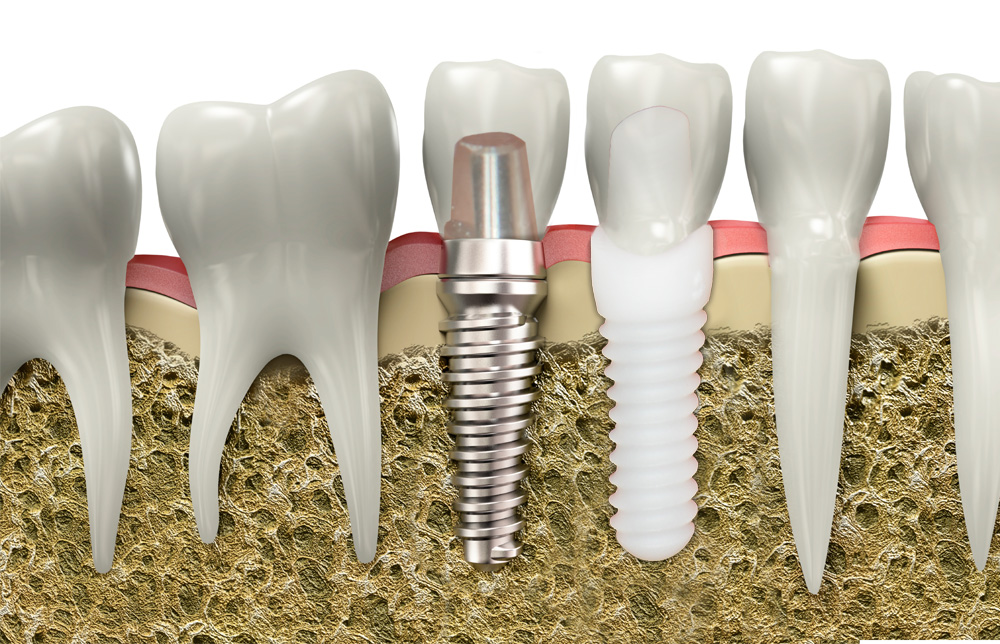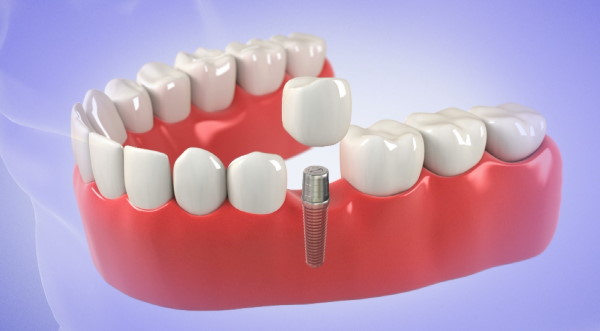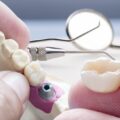Implants are inserted painlessly into the jawbone and take over the function of the natural tooth root. The actual denture – a crown or bridge – is attached to it. In terms of function and aesthetics, dental implants are the perfect solution for tooth loss: they feel like your own teeth, restore chewing function, prevent bone loss in the jaw and protect neighboring teeth. And they look completely natural.
If you as a patient have decided on a dental implant instead of a conventional denture, you may be asking yourself which material is ideal for you: titanium and ceramic? You may be fundamentally critical of metal as a material in medicine and would therefore like a metal-free implant because you fear intolerance and other side effects. We fully understand such concerns!
Patients with chronic pre-existing illnesses such as allergies, diabetes, rheumatism, cardiovascular or metabolic diseases in particular place their hopes on metal-free materials, as a titanium implant has previously hardly been an option for them. However, the discussion about the material question causes a lot of uncertainty, which is why the most important arguments as well as the advantages and disadvantages of dental implants made of ceramic versus titanium are summarized here.
Titanium implant: Scientifically researched and confirmed for a long time
Titanium is currently the most commonly used material in dental implants. The properties relevant to dental implants, such as body tolerance, stability, resilience and longevity, have been carefully researched for a long time. According to scientific studies, high-purity titanium behaves biologically neutral and has excellent tissue compatibility – and there are no allergies to titanium and no actual rejection reaction occurs. This biocompatibility is of great importance for the success of implant treatment. Although a titanium implant is made of metal, overreactions are almost unknown.
Rapid ingrowth and healing of titanium dental implants
Compared to dental implants made of ceramic, titanium implants still have the advantage that they grow into the jawbone and heal more quickly. Due to its biocompatibility, titanium forms a direct molecular connection with the jawbone in the human body – the so-called osseointegration. Long-term experience shows that the implant is well accepted by the surrounding tissue; new bone cells attach firmly to it, which ensures good integration of the new artificial tooth root into the jawbone. Titanium implants are therefore characterized by a high healing rate, which, given the current state of science, supports the use of titanium.
Implant for life: Other good properties of titanium
The precious metal impresses with its very high breaking strength. Since natural bone substance and titanium are very similar in terms of elasticity, implant fractures are extremely rare. Titanium is also light, very stable but still stretchy. It is corrosion resistant and temperature resistant. All of this makes titanium implants extremely durable. You can usually enjoy a professionally placed titanium implant for the rest of your life!
Why pure titanium as a material for implants?
If an implant made of pure titanium is inserted, the body only has to accept a single metal. There are alternative materials made from different titanium alloys with an even higher breaking strength than pure titanium – but since the alloys can sometimes cause undesirable side effects, they are not acceptable from a medical perspective. Due to the complicated manufacturing process, pure titanium is significantly more expensive than steel alloys. But when the focus is on the long-term health of the patient and the lasting success of the treatment, this should of course not be an argument.











